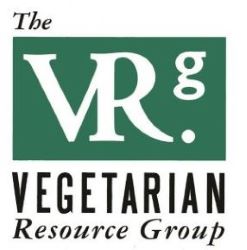VRG Comments on Labeling of Plant-Based Alternatives to Animal-Derived Foods
April 1, 2025
The Vegetarian Resource Group (VRG) welcomes the opportunity to comment on Labeling of Plant-Based Alternatives to Animal-Derived Foods: Guidance for Industry. We appreciate FDA’s overall commitment to having food labels that provide truthful information that helps consumers make informed purchasing decisions.
The market for plant-based alternatives to animal-derived foods is expanding. In the United States, in 2022, the most recent year for which information is available, the total plant-based market value was $8 billion. Sales of plant-based yogurt and plant-based cheese had a 20% and 42% increase respectively in retail sales. Although sales of plant-based meat decreased slightly (1%), the market value of these products was more than $1 billion (1). As of now, there is no specific guidance for the wording that should be used on product labels of “plant-based alternatives.”
We agree with FDA’s recommendations that:
- When looking at the name of the food on the label, the consumer should be able to easily see that it is plant-based and what the main plant ingredient is.
- The food label should include the specific plant source(s) that the food contains.
- If wording is used on the label that suggests that a product is not derived from animals, it would be necessary to indicate what the product is, and the specific plant sources used in the food.
Consumers who are looking for alternatives to animal-derived products need to be able to easily identify these products and to be confident that the products do not contain animal-derived ingredients. Consumers with food allergies or intolerances need to be alerted to the presence of common allergens.
In the Questions and Answers section of this document, in response to question 8 (What are important considerations when labeling plant-based alternative foods as “vegan” or “meat-free”?), FDA says, “The use of truthful and non-misleading label statements (e.g., “vegan,” “meat-free,” “animal-free”, etc.) that helps inform consumers that the products are derived from plants, and are not derived from animals, is appropriate.” We agree with this but believe that the guidance should be expanded so that products that include any animal-derived ingredients could not be labeled “plant-based” in order to reduce consumer confusion and avoid misleading consumers.
We are hopeful that guidance will be provided to industry for labeling products that are produced through the use of genetic engineering and that contain animal protein or are similar to animal protein in structure. Clear labeling is needed to help protect people with food allergies who may be misled by product labels containing statements not clearly informing consumers that the products are based on animal DNA. Examples of this type of misleading label statement include “animal-free” or “vegan.” We propose that food allergen information on these products should be in readable type and on a readable background, not only in the ingredient listing but also along with any other declarations on the labels which may be confusing to the consumer related to the presence of the allergen. These could be when terms are used such as “animal-free” or “vegan.” We do not think that these terms (“animal-free” or “vegan”) should be used on labels of foods that were produced through genetic engineering based on the DNA of animals (whether based on actual DNA, cell lines, or virtual DNA), due to concern for consumer confusion. Additionally, when a product is based on animal DNA, there should be a statement on the label so people know that the product is based on animal DNA.
We recently commissioned a national You.Gov poll of adults in the United States. We asked, “There are types of meat and dairy alternatives that are made using NO animals (or animal products) but are based on animal cells or DNA extracted years ago from a live animal. In your opinion, should (they) Include a statement on the package that informs consumers that the product uses animal cell DNA or is animal gene-derived?” 72% said yes, 10% said no, and 18% didn’t know.
We also asked, “Which of the following, if any, do you expect from a food labeled as a veggie burger? Please select all that apply.” We found:
- 41% of respondents expected that the front of the burger package would identify the main ingredient (such as soy or beans) and say something like “black bean-based veggie burger.”
- 94% did not expect a product labeled as a veggie burger to contain meat from a cow
- 94% did not expect a product labeled as a veggie burger would have similar amounts of cholesterol and saturated fat as a similar animal-derived product
Our results suggest that some, but not all, consumers expect to have the main ingredient of plant-based alternatives included on the label.
VRG is an independent non-profit organization dedicated to educating the public on vegetarianism and the interrelated issues of health, nutrition, environment, ethics, and world hunger. Our health professionals, activists, and educators work with businesses and individuals to bring about healthy changes in schools, workplaces, and the community. Registered dietitians and physicians aid in the development of nutrition-related publications and answer questions about the vegetarian and vegan diet. For the past 31 years, we have commissioned polls exploring vegetarian-related issues, results of which are often used by researchers, the food industry, and the media. Financial support comes primarily from memberships, contributions, and book sales.
Thank you for the opportunity to comment on the proposed guidelines.
Sincerely,
Reed Mangels, PhD, RD, Nutrition Advisor, The Vegetarian Resource Group
Charles Stahler and Debra Wasserman, Co-Directors, The Vegetarian Resource Group

